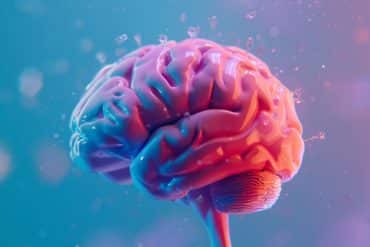Summary: Over 50% of patients with mild traumatic brain injury reported their sense of smell was diminished following concussion. The effect does not appear to be long term.
Source: University of Montreal
It’s long been known that people who suffer a major concussion can lose their sense of smell temporarily and also develop affective problems, such as anxiety and depression. Now scientists have found that’s true even for people who get a minor concussion.
Falling off a bike with a helmet on, having a fender-bender in one’s car, taking a tumble on the ski slopes, slipping on ice and hitting one’s head – these kinds of minor accidents can provoke the same kinds of olfactory and anxiety problems, the researchers found.
In a study published in Brain Injury, an international team led by Université de Montréal neuropsychologists compared 20 hospital patients who had mild concussions to 22 who’d broken limbs but had no concussion. Within 24 hours of their accident, just over half of those with mild concussions had a reduced sense of smell, versus only 5 per of the patients with broken bones. A year later, although their sense of smell was back to normal, the first group of patients had significantly more anxiety than the control group.
“A lot of people will suffer a mild concussion at some point in their life, so realizing they have trouble smelling is the first step to telling their doctor about it,” said lead author Fanny Lecuyer Giguère, who did the research as part of her doctoral thesis in neuropsychology supervised by UdeM associate professor of psychology Johannes Frasnelli.
“It’s important that patients report any loss of smell because it’s not something their general practitioner or emergency-room physician normally asks about.”
Identifying the problem is a short step to getting personalized treatment, she added, with closer follow-up to see if the loss of smell and anxiety persist, indicating the severity of the injury. Physicians should also educate their patients so that they check whether symptoms crop up in the weeks following their accident, she said. “It’s a question of raising awareness: the more people are told to watch for signs of olfactory loss and anxiety, the easier it will be for doctors to respond.”
To test their capacity to identify smells, Lecuyer Giguère visited hospital patients in the alpine ski resort of Visp, Switzerland between December 2016 and February 2017. Almost all those with mild concussions had had a skiing accident. They were all seen within the first 24 hours following their accident, as were those with fractures but no concussion. With scented “Sniffin’ Sticks’ (felt-tip pens) to smell, they were asked to identify synthetic odors of roses, garlic, cloves and solvent, and more.

A year later, the patients were sent a follow-up questionnaire and a set of scratch-and-sniff booklets. By comparing the two groups of patients’ results in the day following their injury and 12 months later, the researchers were able to determine that most who’d lost their sense of smell gained it back within six months of their accident.
What did not significantly diminish, however, were their symptoms of anxiety: thoughts that made them worry, difficulties to relax, and sudden feelings of panic. About 65 percent of the concussed patients reported such symptoms.
Future studies should look at a larger sample of patients to better examine the association between anxiety and olfaction, the authors concluded.
Source:
University of Montreal
Media Contacts:
Jeff Heinrich – University of Montreal
Image Source:
The image is in the public domain.
Original Research: Closed access
“Olfactory, cognitive and affective dysfunction assessed 24 hours and one year after a mild Traumatic Brain Injury (mTBI”). Fanny Lecuyer Giguère et al.
Brain Injury. doi:10.1080/02699052.2019.1631486
Abstract
Olfactory, cognitive and affective dysfunction assessed 24 hours and one year after a mild Traumatic Brain Injury (mTBI)
Objective: This cross-sectional study aimed to evaluate olfaction 24 h (baseline) and 1 year (follow-up) after a mild traumatic brain injury (TBI). We further evaluated the influence of the cognition and affective state on olfactory function.
Method: At baseline, olfactory function, neuropsychological, and affective states were assessed in 42 patients (20 mild TBI; 22 orthopedic injury). At follow-up, 12 patients with mild TBI and 7 controls could be included, and we assessed olfactory function, affective states, and post-concussion symptoms.
Results: At baseline, patients with mild TBI demonstrated significantly reduced olfactory function, compared to controls, with more than 55% of the patients presenting signs of hyposmia. One year later, no significant differences in olfactory scores between cases and controls were observed. However, patients with mild TBI who had exhibited hyposmia at baseline exhibited significantly higher anxiety levels and more post-concussion symptoms than patients with mild TBI with normal olfactory function at baseline.
Conclusions: In the acute phase of mild TBI a majority of patients has impaired olfactory function. Further patients with olfactory dysfunction are more likely to exhibit post-concussion and anxious symptoms at follow-up. Olfactory testing in the acute phase may therefore serve as a screening tool for long-term outcome.






